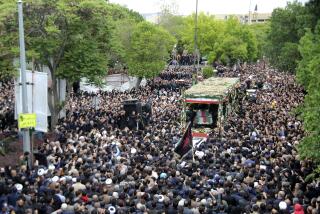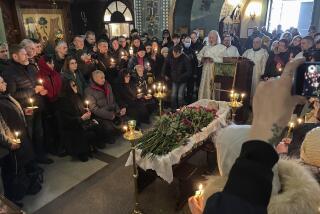South Africans expected to line streets to view Mandela’s body
JOHANNESBURG, South Africa — Tens of thousands of South Africans are expected to line the streets of Pretoria in the coming days as Nelson Mandela’s body is borne daily to the Union Buildings, the seat of national government, to lie in state.
Mandela’s coffin will travel from Pretoria’s main military hospital and back each day for three days, offering the public perhaps the best opportunity to personally bid farewell to the beloved former president and human rights icon who died Thursday.
As government officials spelled out tight security arrangements, strictly limiting public access to major memorial events, they sought to preempt disappointment by urging South Africans to watch the events on large video screens that will be placed in major locations around the country.
Many foreign dignitaries will attend a memorial service Tuesday at the 90,000-seat soccer stadium in Soweto. Much of the seating is likely to be allocated to VIPs and members of Mandela’s African National Congress, bused in from around South Africa.
President Obama and his wife, Michelle, plan to attend the service Tuesday, a White House official said. The service will be the first of the public events, followed by the three days of lying in state in Pretoria, government officials said.
A two-mile security cordon will be placed around Qunu, Mandela’s home village, where he is to be buried Dec. 15. Only the state-controlled broadcast network SABC and a government photographer will be allowed to attend on behalf of the media. Members of the public are expected to line the roads again when his body travels from the airport to his final resting place in Qunu.
Nine thousand people are due to attend the state funeral, including heads of state and dignitaries from around the world.
Access to the Union Buildings will also be tightly controlled, with government officials foreshadowing “some form of accreditation process” for the public seeking to see Mandela lying in state, without spelling out details. It was not clear how this could be organized.
Government officials are encouraging members of the public to line the route rather than to try to get into the Union Buildings, where cellphones and cameras will be strictly banned.
“Details of this route and times will be provided in due course. Government invites mourners to line this route and form a public guard of honor for Tata Madiba when the remains are transported,” said Collins Chabane, minister in the president’s office, using Mandela’s clan name and a term of endearment. He spoke at a news conference Saturday.
“Again, we call on members of the public to cooperate with the authorities to ensure that this event is dignified and secure.”
Chabane said smaller memorial events would be held all over the country, and he urged residents to attend local events.
“Government would like to announce that most of the key events will be broadcast live on television throughout this period, and mourners around the country and the world will therefore be able to follow these events day by day,” he said. “This will help to reduce congestion and potential disaster at key venues.”
Mandela’s family spoke Saturday for the first time since his death, describing in a statement their grief at losing a “great man, a pillar of the family,” who remained humble despite his global fame.
Obama called Mandela’s widow, Graca Machel, on Saturday to extend his condolences.
Mandela’s family, deeply sensitive about the intense media interest in his upcoming funeral, is walking a difficult line between the need for privacy to grieve and the sense that Mandela belonged to the world.
The family is concerned about the possibility of photographs circulating of Mandela lying in state, according to a spokeswoman for the Government Communication and Information System, hence the ban on cellphones and cameras at the Union Buildings.
Military doctors Saturday were preparing Mandela’s body, government officials said.
“The pillar of the family is gone, just as he was away during that 27 painful years of imprisonment,” family spokesman Lt. Gen. Themba Templeton Matanzima said Saturday. He read a statement to journalists but took no questions.
“His presence was like a baobab tree that provided a comforting shade that served as protection and security for us,” he said.
He said the two days since Mandela’s death had been difficult, “and it won’t be pleasant in the days to come.”
“We have lost a great man, a son of the soil, whose greatness in our family was in the simplicity of his nature,” he said.
Matanzima thanked South Africans and citizens of the world for their messages of support.
The Mandela family has been criticized by South Africans, including Nobel Peace Prize laureate Archbishop Desmond Tutu, for an unseemly public fight over Mandela’s burial site since he fell ill in June.
Some relatives have also been criticized for cashing in commercially on the Mandela name.
Matanzima said the family would always seek to emulate Mandela’s values.
More to Read
Sign up for Essential California
The most important California stories and recommendations in your inbox every morning.
You may occasionally receive promotional content from the Los Angeles Times.










